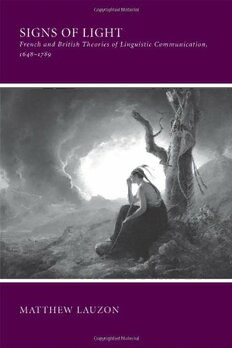Download Signs of light: French and British theories of linguistic communication, 1648-1789 PDF Free - Full Version
Download Signs of light: French and British theories of linguistic communication, 1648-1789 by Matthew Lauzon in PDF format completely FREE. No registration required, no payment needed. Get instant access to this valuable resource on PDFdrive.to!
About Signs of light: French and British theories of linguistic communication, 1648-1789
In Signs of Light, Matthew Lauzon traces the development of very different French and British ideas about language over the course of the late seventeenth and eighteenth centuries and demonstrates how important these ideas were to emerging notions of national character. Drawing examples from a variety of French and English language works in a wide range of areas, including language theory, philosophy, rhetoric, psychology, missionary tracts, and literary texts, Lauzon explores how French and British thinkers of the day developed arguments that certain kinds of languages are superior to others.The nature of animal language and British and French understandings of the languages of North American Indians were vigorously debated. Theories of animal language juxtaposed the apparent virtues of transparency and wit; considerations of savage language resulted in eloquence being regarded as an even higher accomplishment. Eventually, the French language came to be prized for its wit and sociability and English for its simple clarity and vigor. Lauzon shows that, besides concerns about establishing the clarity of introspective representations, questions about the energetic communication of sincere emotion and about the sociable communication of wit were crucial to language theories during this period. A richly interdisciplinary work, Signs of Light is a compelling account of a formative period in language theory.
Detailed Information
| Author: | Matthew Lauzon |
|---|---|
| Publication Year: | 2010 |
| ISBN: | 9780801448478 |
| Pages: | 269 |
| Language: | English |
| File Size: | 0.774 |
| Format: | |
| Price: | FREE |
Safe & Secure Download - No registration required
Why Choose PDFdrive for Your Free Signs of light: French and British theories of linguistic communication, 1648-1789 Download?
- 100% Free: No hidden fees or subscriptions required for one book every day.
- No Registration: Immediate access is available without creating accounts for one book every day.
- Safe and Secure: Clean downloads without malware or viruses
- Multiple Formats: PDF, MOBI, Mpub,... optimized for all devices
- Educational Resource: Supporting knowledge sharing and learning
Frequently Asked Questions
Is it really free to download Signs of light: French and British theories of linguistic communication, 1648-1789 PDF?
Yes, on https://PDFdrive.to you can download Signs of light: French and British theories of linguistic communication, 1648-1789 by Matthew Lauzon completely free. We don't require any payment, subscription, or registration to access this PDF file. For 3 books every day.
How can I read Signs of light: French and British theories of linguistic communication, 1648-1789 on my mobile device?
After downloading Signs of light: French and British theories of linguistic communication, 1648-1789 PDF, you can open it with any PDF reader app on your phone or tablet. We recommend using Adobe Acrobat Reader, Apple Books, or Google Play Books for the best reading experience.
Is this the full version of Signs of light: French and British theories of linguistic communication, 1648-1789?
Yes, this is the complete PDF version of Signs of light: French and British theories of linguistic communication, 1648-1789 by Matthew Lauzon. You will be able to read the entire content as in the printed version without missing any pages.
Is it legal to download Signs of light: French and British theories of linguistic communication, 1648-1789 PDF for free?
https://PDFdrive.to provides links to free educational resources available online. We do not store any files on our servers. Please be aware of copyright laws in your country before downloading.
The materials shared are intended for research, educational, and personal use in accordance with fair use principles.

